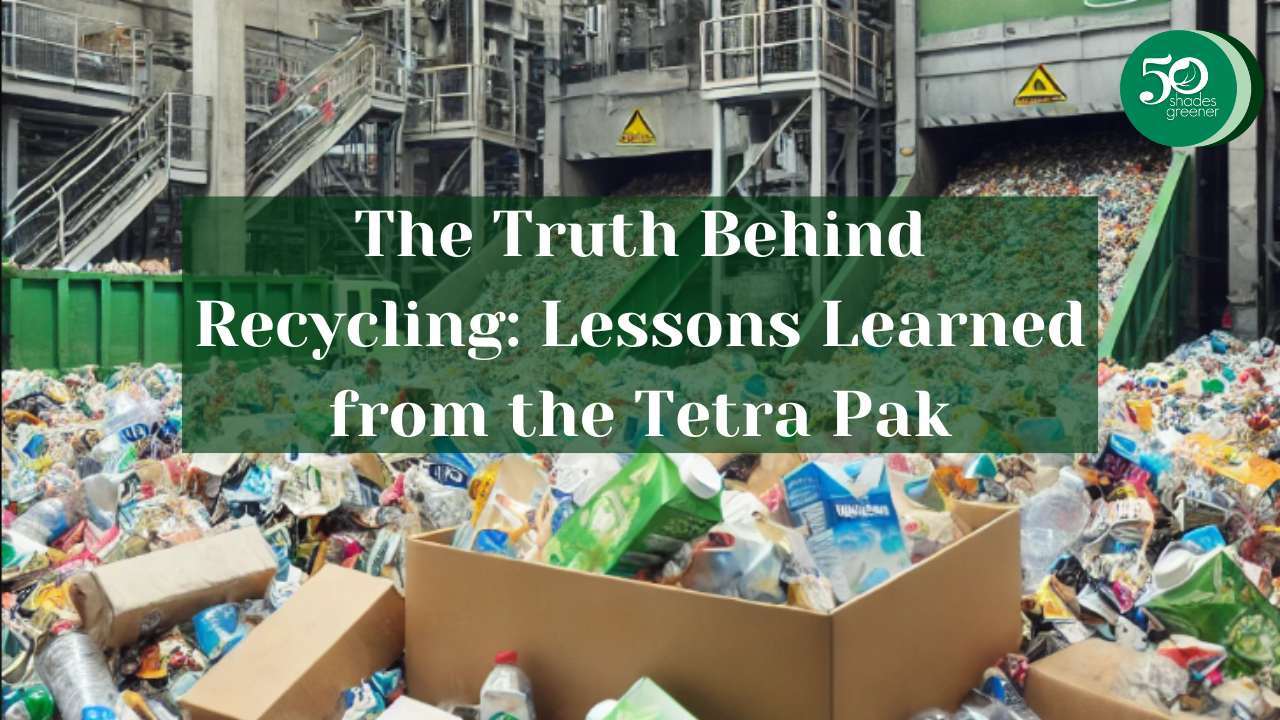The Truth Behind Recycling: Lessons Learned from the Tetra Pak

Recycling: The Great Green Illusion?
Right off the bat, let’s get one thing straight. Recycling is not the sustainability saviour we were promised. For decades, we have been told a lovely narrative: that recycling is the key to sustainability. We’ve been encouraged to sort our waste, rinse out our plastics, and drop our empty cartons into the right bin, believing that we’re playing our part in saving the planet. Hate to be the one to break it to you, but this whole system is flawed. “Reduce, Reuse, Recycle” was always meant to be a hierarchy, yet somehow, we’ve been conditioned to skip the first two and jump straight to “Recycle” like it’s a get-out-of-guilt-free card. Who’s to blame? Let’s take a quick history lesson….
What if we told you that this narrative was designed to shift responsibility away from the real culprits—corporations and manufacturers—and onto us, the consumers? What if, instead of being the solution, recycling is actually a very cleverly marketed disguise for the...
The 7 basic steps to reduce your carbon emissions
Allow us to steal 3 minutes of your time today to show you just how simple it is to reduce your hotel’s carbon footprint and even achieve carbon neutrality.
Sustainability is a word that is thrown around constantly and in so many scenarios that it becomes an unachievable task and a blurry concept in our minds. So we want to demystify 'sustainability' and break it into actionable steps:

Calculate your current Carbon Emissions
Once again, this is easier than you might think.
- Firstly you need to begin to analyse and understand your utility bills for waste, water and energy.
- Set up a system and assign a person from your team to monitor the CO2 kg produced at your business every month – this person is going to be your Green Manager who should report to you and the rest of the time periodically.
- Observe your building, where and when is energy being used, where and when is water being used and where and what waste is being produced.
- Provide team training to your employees fro...
5 Green Year Resolutions your Business can make

This past year has been as unparalleled as 2020, with many hoping for better things to come in 2022...
What has been crystal clear, is that society is demanding more. More from our governments, more from businesses and more from ourselves.
2030, 2050- these 'net zero' targets and others are only around the corner and where once before, the issue of climate change was left to the policy makers around the world, people are demanding transparency and real action.
What about us? And our own impact on the environment?
We know we have to do something about our own Carbon Footprint, but often we are not really sure how to go about it.
Customer demand for a Greener Hospitality industry is on the rise. Those that adapt, change and market their efforts well, will see the benefits of listening to what their customers want, and become “favourites” in a landscape of competitive industry.
Working with hospitality businesses, I have heard all kinds of excuses over the years:
“I just do not h...
Environmental education - A MUST for a true Green recovery
In 2015 at COP21 in Paris, it was agreed and became a part of the remit for many governments, that for the next 30 years there HAS to be a reduction in global carbon emissions.
For this to come to fruition in the future, we cannot only introduce higher rates of carbon tax, invest in public transport or simply upgrade our energy extractions to renewables.
There is no doubt that all these actions will result in a greener economy, and I am certainly not disputing this. However there is one vital component to achieving true environmental sustainability that is missing, and that is to provide EDUCATION to all members of our society.
Imagine for a moment if you will, an Ireland in the year 2040… Our government has embedded Environmental Education into our school’s curriculum - from primary school right through to adult education, and this has been ongoing since 2021.
The basic principles of environmental sustainability are now second nature to the current workforce. We all know how to...
Chocolate with a Conscience
Recently, we met with Clare Tait, the founder and owner of Chocolatey Clare, an Irish business making a range of luxury confectionary. The products are vegan-friendly; dairy, gluten and palm-oil free; with ethically sourced, where possible -organic ingredients; and plastic free packaging.
At Fifty Shades Greener, we have broadened our green business online and training programmes to include social sustainability, green purchasing and green marketing.
We want to share how important it is to generate sustainability throughout all our business practices, and that includes who we partner with. We always love to celebrate an Irish product and particularly one that is environmentally friendly.
Clare Tait has considered sustainable elements from the inception of her business. She quotes greener.ie explaining “true sustainability is about understanding your supply chain and working with the right partners, not focusing on your business in isolation”. Clare works to ensure that all wo...
Why do we not have clear guidelines to avoid Green Washing?
The Irish times has published an article entitled “Five trends in Green Finance”. It states that:
“The European Commission published a statement this year estimating that 42 per cent of corporate websites contain “exaggerated, false or deceptive and could potentially qualify as unfair commercial practices under EU rules”.
I have often asked myself “Why do we not have clear guidelines and benchmarks established by our leaders to avoid Green Washing?”
One would think that after the Paris agreement becoming such a landmark treaty that laws and systems would have been put in place by now to ensure its validity.
Evidently, we are not there yet.
The term Greenwashing was first coined in the 1980's to describe behaviour or activities that make people believe that a company is doing more to protect the environment than it actually is.
So what can you do to avoid green washing?
In your organisation:
- Never ever claim you do more than what you actually do. Be honest and transparent in ...
Was recycling the biggest swindle of the past 20 years?
Prenote: I am not saying Recycling is a bad thing, but our current main stream systems of recycling have failed us.
In July 2019 The Guardian shared an article titled “Humans have made 8.3 billion metric tonnes of plastic since 1950” If you missed it the link is at the end of this blog.
The Current Situation
The article stated that up until then we had no idea how much plastic we had created and now that we know, the picture is not pretty. 8.3 billion metric tonnes of plastic has been created from 1950 to 2015, that is a terrifying statistic. It is the equivalent to the weight of 1 Billion elephants!
However the worst element of this, is that only 30% of the plastic created is still in use. The rest has been disposed of in three ways: 79% is in our landfills and environment, 12% has been incinerated and only 9% has been recycled. Amongst all this dismal data, what really got me thinking, is that half of the amount of plastic generated since 1950, was actually made in the last 15...
3 Top Tips to run a green Hotel
Sustainability has so many definitions that it can often drive people to distraction…
What does it actually mean? How do I make my own business more sustainable? How do I know if I am successful at greening my business?
The answers are much simpler than people may think and I'll tell you why.
Here at the Fifty Shades Greener office, a ‘green’ or sustainable business is simply one that reduces its impact to the environment. Businesses affect the environment in 3 ways; through their use of energy, production of waste and consumption of water.
In order to run an environmentally friendly business, you first need to reduce your business’s utilities, and the best part of this journey is that not only will you reduce your business’s Carbon Footprint and impact to the environment - you will also SAVE MONEY off your utility bills.
It is a win/win situation for any business owner.
Yet 99% of the Hotel owners I meet on a weekly basis, do not have a handle on these 3 pillars of sustainabilit...
How to achieve a lower carbon lifestyle
Reducing carbon emissions should not be left to the large corporations alone. There are small changes and steps we can ALL learn to reduce our own carbon footprint.
Yes, I agree that for real impact it is vital that large corporations and governments adopt different policies when it comes to protecting our environment. But it does not take away from the fact that there many ways in which WE can assist in promoting a more circular economy and a culture of sustainability.
If you are at that point where you want to make changes but you do not know how or where to start, we are here to help.
Let’s start with those simple daily, weekly or monthly activities that impact the environment.
I can come up with one easy list of things, amongst many others:
- The energy we use
- The water we use
- The waste we produce
- The way we travel to and from places
- The purchases we make
If you have been following us for a while, you will know by now that we concentrate on the first 3; the reduction ...
"Fly if you like, I won’t judge you." – Greta Thunberg
“Fly if you like, I won't judge you” was a statement that Greta Thunberg gave to The Sunday Times Magazine as she turned 18.
This sentence really got me thinking about influence and divisive ideals and opinions. Something we are seeing more and more in modern society in the midst of this Trump era, is the rise of the far right all over the world and more worryingly - extremism.
The definition of polarising is ‘to cause something, especially something that contains different people or opinions, to divide into two completely opposing groups: “The debate is becoming polarised and there seems to be no middle ground.”’
We have all seen first hand the damage that a destructive leader can do during Trump’s presidency, culminating in the assault on the Capitol Building on January 6th.


